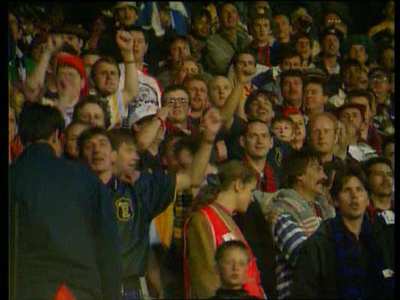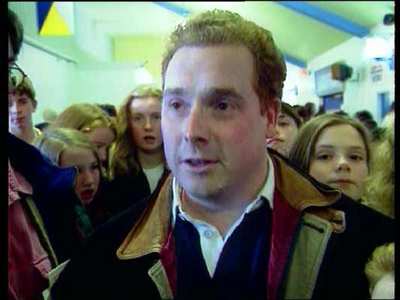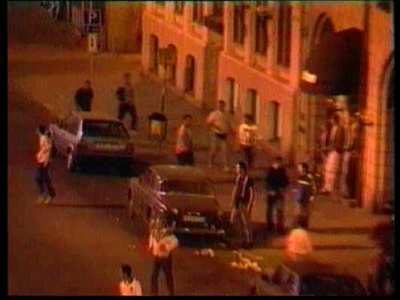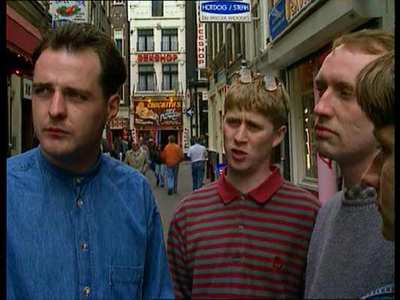Review of Trouble On The Terraces
Introduction
Football, the national pastime often seems to be synonymous with crowd violence. Despite strenuous efforts by the authorities, politicians and football clubs themselves, wherever you get two groups of fervent and diametrically opposed supporters, the potential for violence always remains. It has gotten to the point now that when football violence resurges, it`s not so much of a shock, but more of a sinking feeling as a objectionable side of society rears its ugly head. Media interest in football hooliganism has always been disproportionate, and I recall a time in the eighties when news reporters used to pounce with glee at another instance of violence, all conveniently televised.
Trouble On The Terraces was an in-depth documentary on the subject made in 1994. Comprising interview from all parties, including confessed hooligans, academics as well as club officials and police spokespersons (albeit the Dutch police), this film tries to understand the historical precedents and the psychology that informs football violence, It takes a look at how the problem is experienced and handle globally as well as in the UK.

Video
The picture is typical of documentaries made in the mid nineties; the best quality footage belongs to the interviews, which are of a typical videotape quality. The older footage of crowd violence is naturally less sharp. This isn`t the kind of programme where video quality is paramount, but it is largely of viewable quality. The programme is presented in 4:3. Each of the chapters is presented with a tacky green caption, more suited to seventies documentaries rather than a mid-nineties one.

Audio
The soundtrack is a DD 2.0 one and again is perfectly acceptable for the documentary. The music is execrable, some kind of synthesised crowd chant over an ominous beat that presages all the footage of violence. The lower frequencies sound particularly distorted, even affecting an interviewee with a deep voice. Some of the regional accents are a little thick and aren`t helped by the absence of subtitles.

Features
I got my first indication that all was not well with this disc with the extras. Actually the menu screens alerted me to the problem. They comprise footage of football crowd artfully arranged in the form of a St George`s Cross, all of it tinted blood red. This could be considered innocuous, even suitable considering the subject matter, but the extras on this disc confirm my misgivings.
The first is a Review of the documentary that lasts 6½ minutes. Cass Pennant speaking recently delivers this. Cass Pennant is an Author and `Hoolioligist` who was a member of the ICF, West Ham`s hardcore fans. He speaks at length about the documentary and really sells it as what seems to be a glorification of violence in football grounds.
There is also Football Culture where Cass Pennant talks for some 7½ minutes about the culture of football, the associated clothes and music and its effect on society. This begins innocuously enough but pretty soon he`s sounding nostalgic for the bad old days again.
Finally there is the Welcome to The ICF extracts. This is a series of 6 stills with text describing a violent incident with an opposing group of fans.

Conclusion
The documentary in its own right is a valid piece of television. It goes into some detail about football violence and attempts to present a balanced view. As well as talking to academics and officials it also questions the perpetrators of the violence and tries to understand their motivations. All of this is interspersed with excerpts of violent incidents on and off the pitch. This footage has ominous thumping music to point out just how sickening this all is. There is also not a lot of footage and a lot of repetition. Some poor guy must have had his head jumped upon five or six times in the course of this programme. It also isn`t as excessive as I expected, though that may be more due to the culture of 2002 when a best selling title is Bumfights, rather than the footage on this disc.
The interview footage takes a good cross section of views and some are insightful, some are downright obvious and some are ridiculous. One of the academics went into some detail about the history of football violence as it relates to tribalism, and how football grew from what was basically an annual organised battle between neighbouring villages. When he waxed lyrical about this and decried the modern game as clinical and sterile, I was pointedly reminded of the difference between knowledge and wisdom.
The problem with the documentary is that football violence just isn`t as prevalent as it is made out to be on this disc, either in 1994 or today, and as a result the documentary just reeks of sensationalism. Also the fact that this is a 1994 programme makes it instantly dated and hardly relevant or cutting edge for modern audiences. With BBC reporters going undercover as soccer hooligans, and incisive Channel 4 documentaries describing Neo-Nazi hooligans in European football, this documentary just seems horribly outdated, both in content and style. I could only see this documentary of use as a snapshot in British history and of little other use.
What really concerns me is the way this disc has been packaged and presented, from the almost nationalistic menu screens, to the distasteful extras. Statements championing violence in the context of a balanced documentary are acceptable and understandable, but packaging the documentary with what amounts to an endorsement of this documentary as a motivational tool for would-be hooligans is irresponsible in the extreme. While the documentary was innocuous and rather tame in my opinion, the extras left a bad taste in my mouth, and I have never been so glad to see Smokey and the Bandit III on my TV as I was when I ejected this disc.
This disc is the DVD equivalent of the PC game Hooligans: Storm Over Europe. No one deserves to profit from this title, and save your hard earned dosh, or they may produce a sequel.
Your Opinions and Comments
Be the first to post a comment!